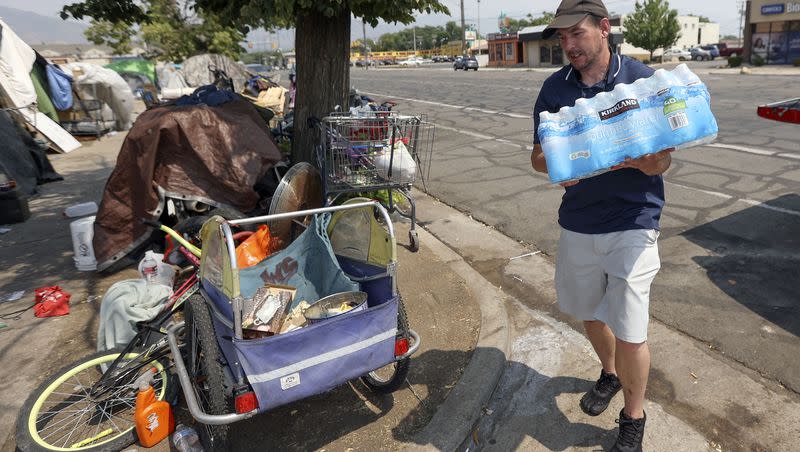Bill intended to improve Utah’s homelessness services passes House 74-0

A measure intended to improve how Utah manages services for people experiencing homelessness won unanimous approval Tuesday in the Utah House of Representatives.
HB298, sponsored by Rep. Tyler Clancy, R-Provo, calls for changes in data collection, replacing the Utah Homelessness Council with a smaller board, and new accountability measures.
“We can’t simply invest resources and take our hand off the wheel and think it will suffice. I acknowledged HB298 is far from a cure to this complex problem but it is absolutely a marked departure from the status quo. I believe that’s what our homeless brothers and sisters desperately need,” said Clancy, who encounters numerous people experiencing homelessness in his work as a police officer.
With respect to data, the legislation would create a mechanism called “functional zero” that “we believe will help policymakers unravel some of the unique challenges that our homeless community faces,” he said. It will measure new entries to the system, individuals presently in our homeless services system and those who exit it.
“We know that if we can’t measure a challenge, we can’t manage it. The problem with our homeless services data isn’t the lack of available data but effective data,” he said.
The bill calls for the replacement of the 29-member Utah Homelessness Council, replacing it with a nine-member Utah Homeless Services Board.
Related
The council has become “unwieldy and clunky and doesn’t serve our homeless brothers and sisters effectively,” he said.
As for accountability, “we want to make sure that our money is doing more than good intentions and is really helping individuals who need it the most.”
Under HB298, all funding and policy decisions will come before the Utah Homeless Services Board.
“We believe that this will allow for better collaboration with cities, counties and state leaders to make sure that we know where the money’s being spent and if it’s being spent productively,” he said.
Late last week, House Speaker Mike Schultz predicted the bill would have broad support given the language that calls for greater accountability for public resources and philanthropy dedicated to serving people experiencing homelessness.
“I just have to give a huge shout-out to them (private donors). I mean, they’re literally dedicated to this. They’re helping us, the state. They’re bringing a business perspective to it, demanding accountability and making sure that the dollars of the state as well as their money that they put into it are being best used to add to get outcomes,” Schultz said.
Effectively addressing homelessness requires a “bifurcated approach,” Clancy said during House debate.
“We need those boots on the ground. We need those courageous community leaders to go into the homeless encampments to meet people where they are and to shake their hand so look into their eyes and say ‘We believe in you. We can have a brighter future,” he said.
“We also need effective and responsive systems. And this is what this bill seeks to do. We can’t simply invest resources and take our hand off the wheel and think it will suffice.”
HB298 moves to the Senate for further consideration.

